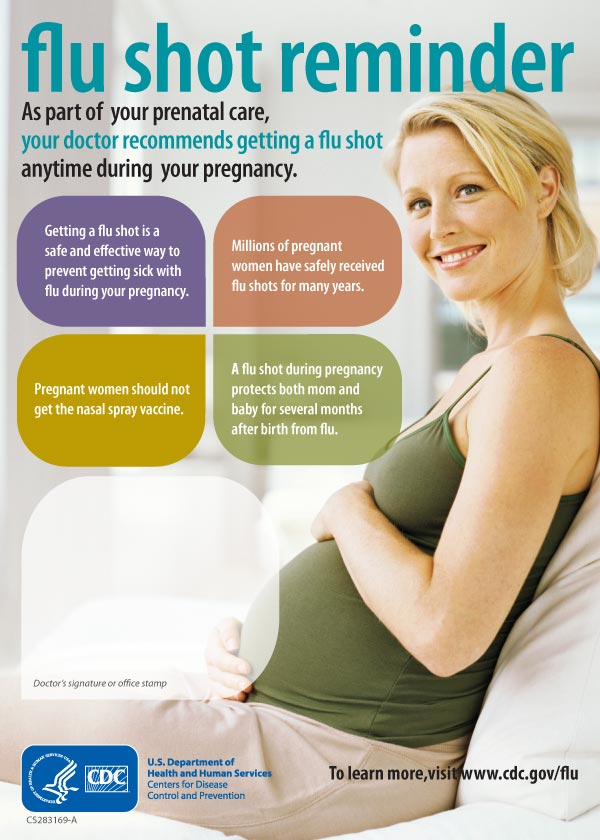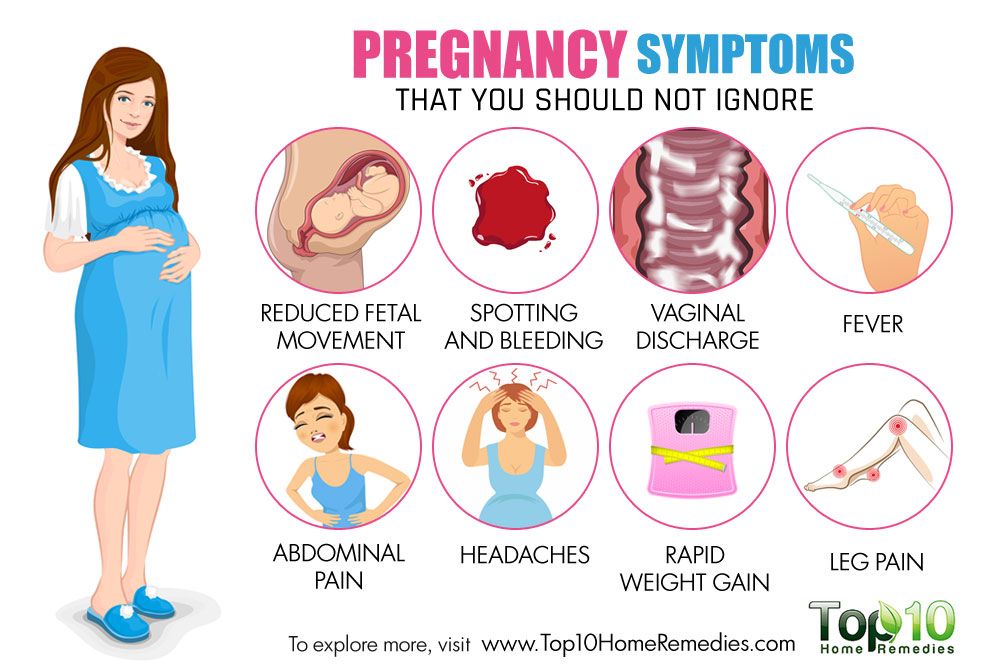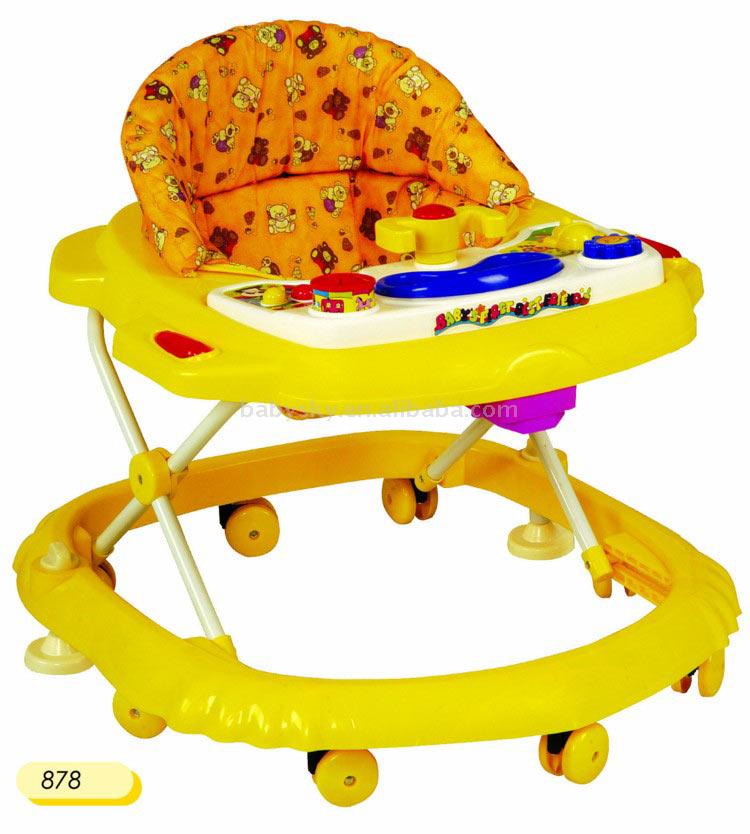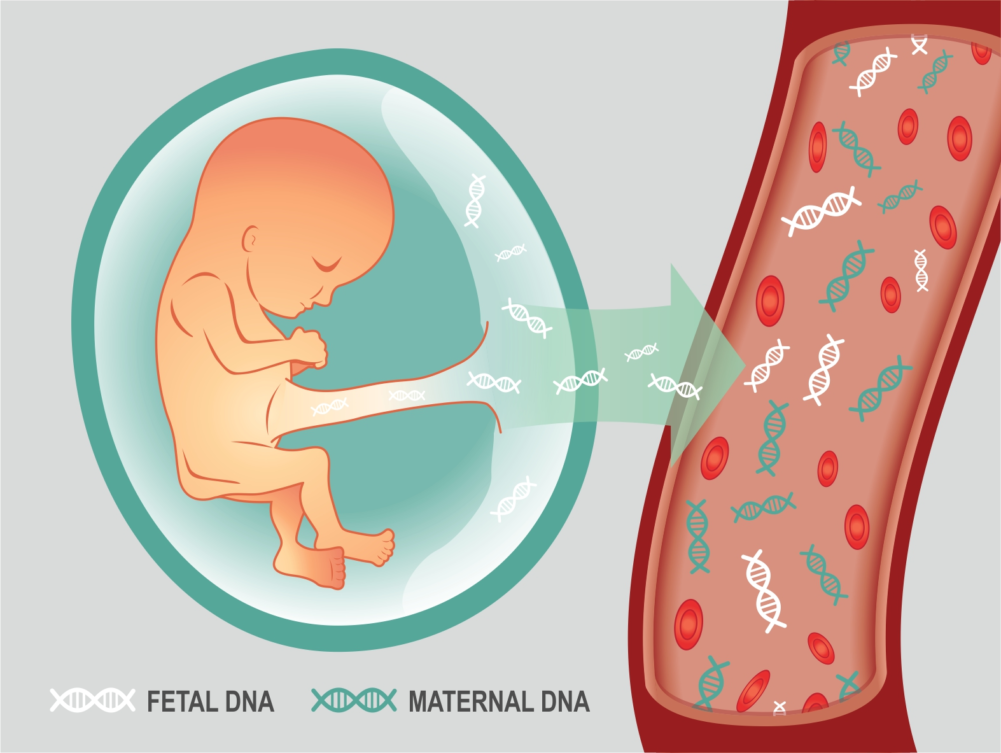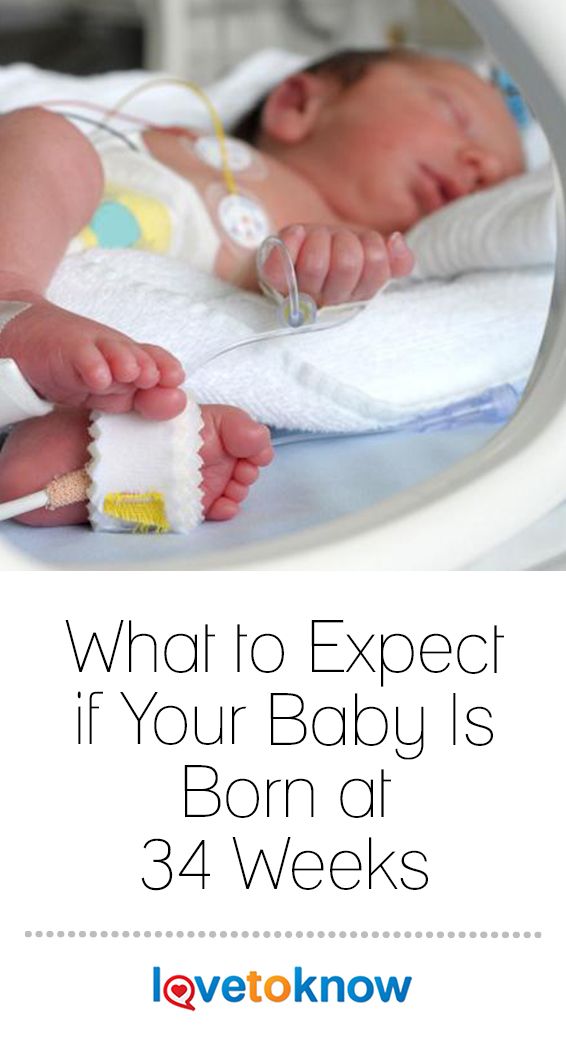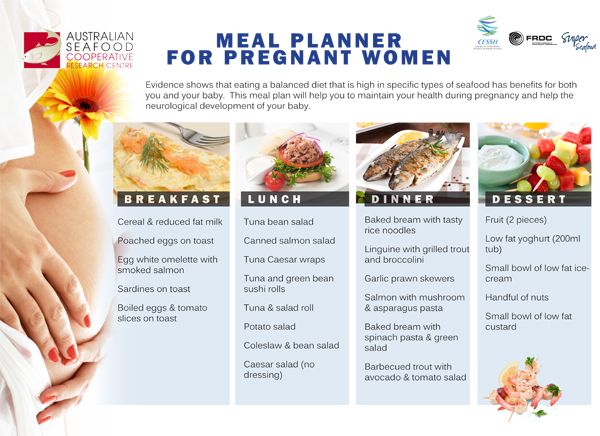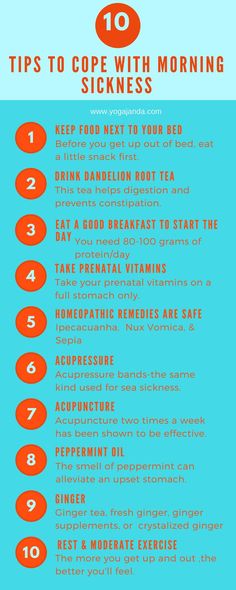Things pregnant women should do
Health Tips for Pregnant Women
In this section:
- Healthy Weight
- Healthy Eating
- Physical Activity
- After the Baby Is Born
Having a baby is an exciting time that often inspires women to make healthier lifestyle choices and, if needed, work toward a healthy body weight. Here you’ll find tips on how to improve your eating and physical activity habits while you’re pregnant and after your baby is born.
These tips can also be useful if you’re not pregnant but are thinking about having a baby! By making changes now, you can get used to new lifestyle habits. You’ll give your baby the best possible start on life and be a healthy example to your family for a lifetime.
Being active when you’re expecting can help you have a healthy pregnancy.Healthy Weight
Why is gaining a healthy amount of weight during pregnancy important?
Gaining an appropriate amount of weight during pregnancy helps your baby grow to a healthy size. But gaining too much or too little weight may lead to serious health problems for you and your baby.
According to experts, gaining too much weight during pregnancy raises your chances for developing gestational diabetes (diabetes during pregnancy) and high blood pressure during pregnancy. It also increases your risk for type 2 diabetes and high blood pressure later in life. If you’re overweight or have obesity when you get pregnant, your chances for health problems may be even higher. You could also be more likely to have a cesarean section (C-section).
Gaining a healthy amount of weight helps you have an easier pregnancy and delivery. It may also help make it easier for you to get back to a healthy weight after delivery. Research shows that recommended amounts of weight gain during pregnancy can also lower the chances that you or your child will have obesity and weight-related problems later in life.
How much weight should I gain during my pregnancy?
How much weight you should gain depends on your body mass index (BMI) before pregnancy. BMI is a measure of your weight in relation to your height. You can use a formula to calculate your BMI online.
BMI is a measure of your weight in relation to your height. You can use a formula to calculate your BMI online.
The general weight-gain advice below is for women having only one baby.
| If you1 | You should gain about |
|---|---|
| Are underweight (BMI less than 18.5) | 28 to 40 pounds |
| Are at a healthy weight (BMI of 18.5 to 24.9) | 25 to 35 pounds |
| Are overweight (BMI of 25 to 29.9) | 15 to 25 pounds |
| Have obesity (BMI of 30+) | 11 to 20 pounds |
It’s important to gain weight very slowly. The old myth that you’re “eating for two” is not true. During the first 3 months, your baby is only the size of a walnut and doesn’t need many extra calories. The following rate of weight gain is advised
- 1 to 4 pounds total in the first 3 months
- 2 to 4 pounds each month from 4 months until delivery
Talk to your health care professional about how much weight gain is appropriate for you. Work with him or her to set goals for your weight gain. Take into account your age, weight, and health. Track your weight at home or when you visit your health care professional.
Work with him or her to set goals for your weight gain. Take into account your age, weight, and health. Track your weight at home or when you visit your health care professional.
Don’t try to lose weight if you’re pregnant. Your baby needs to be exposed to healthy foods and low-calorie beverages (particularly water) to grow properly. Some women may lose a small amount of weight at the start of pregnancy. Speak to your health care professional if this happens to you.
Healthy Eating
How much should I eat and drink?
Consuming healthy foods and low-calorie beverages, particularly water, and the appropriate number of calories may help you and your baby gain the proper amount of weight.
How much food and how many calories you need depends on things such as your weight before pregnancy, your age, and how quickly you gain weight. If you’re at a healthy weight, the Centers for Disease Control and Prevention (CDC) says you need no extra calories in your first trimester, about 340 extra calories a day in your second trimester, and about 450 extra calories a day in your third trimester.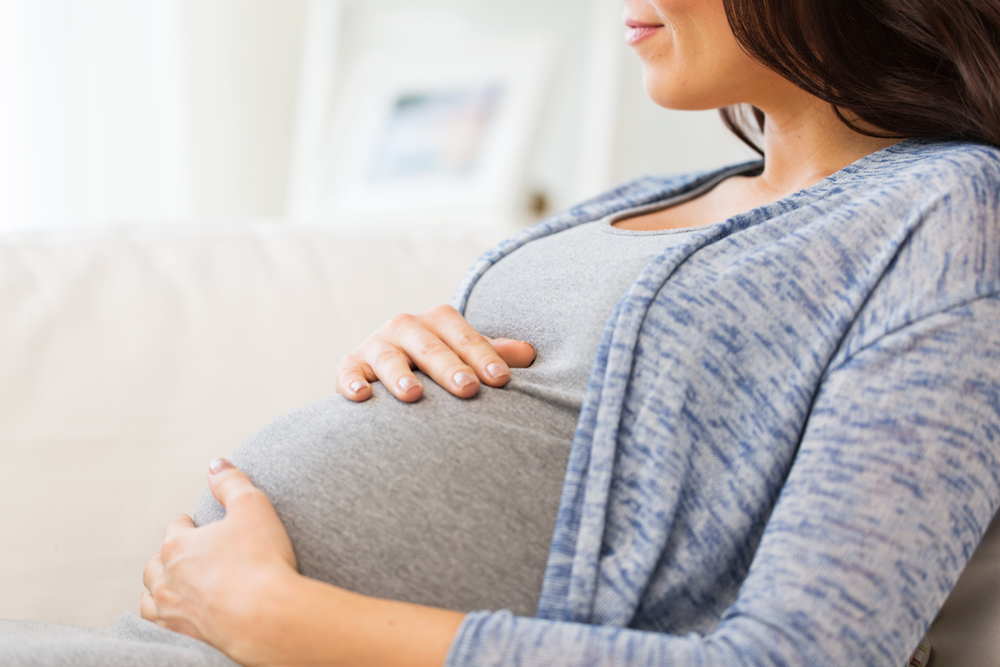 1 You also may not need extra calories during the final weeks of pregnancy.
1 You also may not need extra calories during the final weeks of pregnancy.
Check with your health care professional about your weight gain. If you’re not gaining the weight you need, he or she may advise you to take in more calories. If you’re gaining too much weight, you may need to cut down on calories. Each woman’s needs are different. Your needs also depend on whether you were underweight, overweight, or had obesity before you became pregnant, or if you’re having more than one baby.
What kinds of foods and beverages should I consume?
A healthy eating plan for pregnancy includes nutrient-rich foods and beverages. The Dietary Guidelines for Americans, 2020–2025 recommend these foods and beverages each day
- fruits and vegetables (provide vitamins and fiber)
- whole grains, such as oatmeal, whole-grain bread, and brown rice (provide fiber, B vitamins, and other needed nutrients)
- fat-free or low-fat milk and milk products or nondairy soy, almond, rice, or other drinks with added calcium and vitamin D
- protein from healthy sources, such as beans and peas, eggs, lean meats, seafood that is low in mercury (up to 12 ounces per week), and unsalted nuts and seeds, if you can tolerate them and aren’t allergic to them.

A healthy eating plan also limits salt, solid fats (such as butter, lard, and shortening), and sugar-sweetened drinks and foods.
Fruit, colorful vegetables, beans, fish, and low-fat dairy are rich sources of nutrients needed during pregnancy.Does your eating plan measure up? How can you improve your habits? Try consuming fruit like berries or a banana with hot or cold cereal for breakfast; a salad with beans or tofu or other non-meat protein for lunch; and a lean serving of meat, chicken, turkey, or fish and steamed vegetables for dinner. Think about new, healthful foods and beverages you can try. Write down your ideas and share them with your health care professional.
For more about healthy eating, see the MyPlate Daily Checklist. It can help you make an eating plan for each trimester (3 months) of your pregnancy.
A meal of steamed veggies and grilled chicken breast contains nutrients without too many calories.What if I’m a vegetarian?
A vegetarian eating plan during pregnancy can be healthy. Consider the quality of your eating plan and talk to your health care professional to make sure you’re getting enough calcium, iron, protein, vitamin B12, vitamin D, and other needed nutrients. Your health care professional may also tell you to take vitamins and minerals that will help you meet your needs.
Consider the quality of your eating plan and talk to your health care professional to make sure you’re getting enough calcium, iron, protein, vitamin B12, vitamin D, and other needed nutrients. Your health care professional may also tell you to take vitamins and minerals that will help you meet your needs.
Do I have any special nutrition needs now that I’m pregnant?
Yes. During pregnancy, you need more vitamins and minerals such as folate, iron, and calcium.
Getting the appropriate amount of folate is very important. Folate, a B vitamin also known as folic acid, may help prevent birth defects. Before pregnancy, you need 400 mcg per day from supplements or fortified foods, in addition to the folate you get naturally from foods and beverages. During pregnancy, you need 600 mcg. While breastfeeding, you need 500 mcg of folate per day.2 Foods high in folate include orange juice, strawberries, spinach, broccoli, beans, fortified breads, and fortified low-sugar breakfast cereals. These foods may even provide 100% of the daily value of folic acid per serving.
These foods may even provide 100% of the daily value of folic acid per serving.
Most health care professionals tell women who are pregnant to take a prenatal vitamin every day and consume healthy foods, snacks, and beverages. Ask your doctor about what you should take.
What other new habits may help my weight gain?
Pregnancy can create some new food, beverage, and eating concerns. Meet the needs of your body and be more comfortable with these tips. Check with your health care professional with any concerns.
- Eat breakfast every day. If you feel sick to your stomach in the morning, try dry whole-wheat toast or whole-grain crackers when you first wake up. Eat them even before you get out of bed. Eat the rest of your breakfast (fruit, oatmeal, hot or cold cereal, or other foods) later in the morning.
- Eat high-fiber foods. Eating high-fiber foods, drinking water, and getting daily physical activity may help prevent constipation.
 Try to eat whole-grain cereals, brown rice, vegetables, fruits, and beans.
Try to eat whole-grain cereals, brown rice, vegetables, fruits, and beans. - If you have heartburn, eat small meals spread throughout the day. Try to eat slowly and avoid spicy and fatty foods (such as hot peppers or fried chicken). Have drinks between meals instead of with meals. Don’t lie down soon after eating.
What foods and drinks should I avoid?
Certain foods and drinks can harm your baby if you have them while you’re pregnant. Here’s a list of items you should avoid.
- Alcohol. Do not drink alcohol, such as wine, beer, or hard liquor.
- Caffeine. Enjoy decaf coffee or tea, drinks not sweetened with sugar, or water with a dash of juice. Avoid diet drinks, and limit drinks with caffeine to less than 200 mg per day—the amount in about 12 ounces of coffee.3
- Fish that may have high levels of mercury (a substance that can build up in fish and harm an unborn baby).
 Limit white (albacore) tuna to 6 ounces per week. Do not eat king mackerel, marlin, orange roughy, shark, swordfish, or tilefish. To get the helpful nutrients in fish and shellfish, you may eat up to 12 ounces of seafood per week, choosing from many safe seafood choices (PDF, 387.44 KB) , such as cod, salmon, and shrimp.3
Limit white (albacore) tuna to 6 ounces per week. Do not eat king mackerel, marlin, orange roughy, shark, swordfish, or tilefish. To get the helpful nutrients in fish and shellfish, you may eat up to 12 ounces of seafood per week, choosing from many safe seafood choices (PDF, 387.44 KB) , such as cod, salmon, and shrimp.3 - Foods that may cause illness in you or your baby (from viruses, parasites, or bacteria such as Listeria or E. coli). Avoid soft cheeses made from unpasteurized or raw milk; raw cookie dough; undercooked meats, eggs, and seafood; and deli salads. Take care in choosing and preparing lunch meats, egg dishes, and meat spreads. See more food safety guidelines during pregnancy.
- Anything that is not food. Some pregnant women may crave something that is not food, such as laundry starch, clay, ashes, or paint chips. This may mean that you’re not getting the right amount of a nutrient.
 Talk to your health care professional if you crave something that isn’t food. He or she can help you get the right amount of nutrients.
Talk to your health care professional if you crave something that isn’t food. He or she can help you get the right amount of nutrients.
Physical Activity
Should I be physically active during my pregnancy?
Almost all women can and should be physically active during pregnancy. According to current physical activity guidelines (PDF, 14.4 MB) , regular physical activity may
- help you and your baby gain the appropriate amounts of weight
- reduce backaches, leg cramps, and bloating
- reduce your risk for gestational diabetes (diabetes during pregnancy)
- reduce your risk for postpartum depression
There's also some evidence that physical activity may reduce the risk of problems during pregnancy such as preeclampsia (high blood pressure during pregnancy), reduce the length of labor and postpartum recovery, and reduce the risk of having a cesarean section (or C-section).
If you were physically active before you became pregnant, you may not need to change your exercise habits. Talk with your health care professional about how to change your workouts during pregnancy.
Talk with your health care professional about how to change your workouts during pregnancy.
Being physically active can be hard if you don’t have childcare for your other children, haven’t exercised before, or don’t know what to do. Keep reading for tips about how you can work around these hurdles and be physically active.
Almost all women can and should be physically active during pregnancy.How much and what type of physical activity do I need?
According to current guidelines (PDF, 14.4 MB) , most women need the same amount of physical activity as they did before becoming pregnant. Aim for at least 150 minutes a week of moderate-intensity aerobic activity. Aerobic activities—also called endurance or cardio activities—use large muscle groups (back, chest, and legs) to increase your heart rate and breathing. Brisk walking is a form of aerobic activity.
How can you tell if you’re doing moderate-intensity aerobic activity? Take the “talk test” to find out.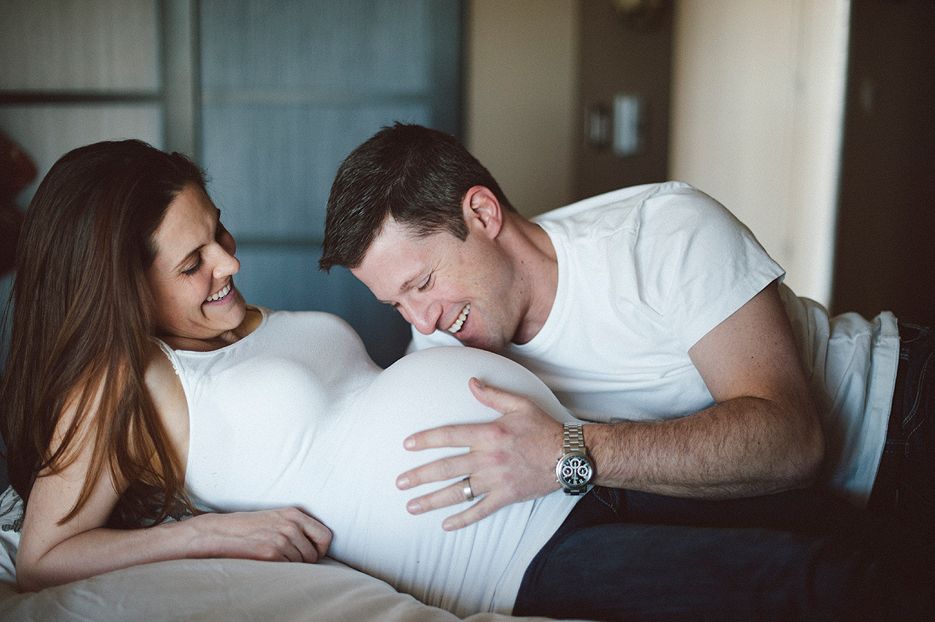 If you’re breathing hard but can still have a conversation easily—but you can’t sing—that’s moderate intensity.
If you’re breathing hard but can still have a conversation easily—but you can’t sing—that’s moderate intensity.
If you can only say a few words before pausing for a breath, that’s called vigorous-intensity activity. If you were in the habit of doing vigorous-intensity aerobic activity or were physically active before your pregnancy, then it’s likely okay for you to continue these activities during your pregnancy.
You can talk to your health care professional about whether to or how to adjust your physical activity while you’re pregnant. If you have health issues such as obesity, high blood pressure, diabetes, or anemia (too few healthy red blood cells), ask your health care professional about a level of activity that’s safe for you and your unborn baby.
How can I stay active while pregnant?
Even if you haven’t been active before, you can be active during your pregnancy. Here are some tips.
- Go for a walk where you live, in a local park, or in a shopping mall with a family member or friend.
 If you already have children, take them with you and make it a family outing.
If you already have children, take them with you and make it a family outing. - Get up and move around at least once an hour if you sit most of the day. When watching TV or sitting at your computer, get up and move around. Even a simple activity like walking in place can help.
- Make a plan to be active while pregnant. List the activities you’d like to do, such as walking or taking a prenatal yoga class. Think of the days and times you could do each activity on your list, such as first thing in the morning, during your lunch break from work, after dinner, or on Saturday afternoon. Look at your calendar or phone or other device to find the days and times that work best and commit to those plans.
How can I stay safe while being active?
For your health and safety, and for your baby’s, you should not do certain physical activities while pregnant. Some of these are listed below. Talk to your health care professional about other physical activities you should not do.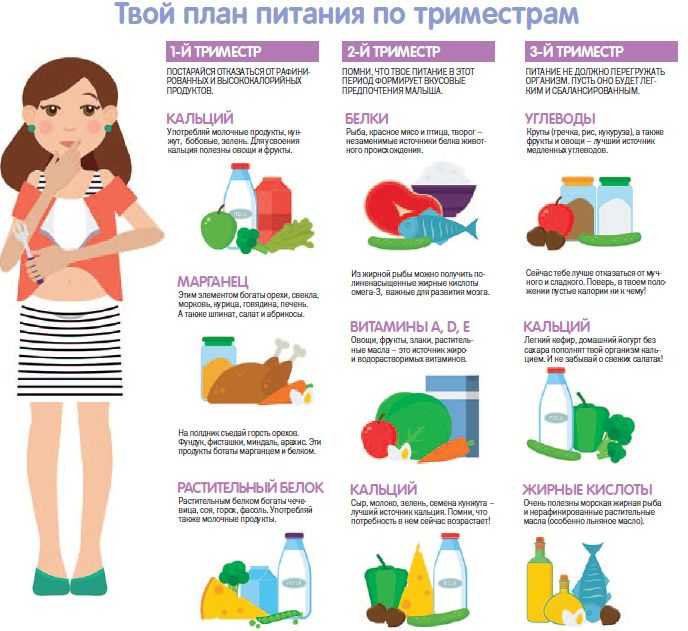
Safety do’s and don’ts
Follow these safety tips while being active.
| Do… | Don’t… |
|---|---|
| Choose moderate activities that aren’t likely to hurt you, such as walking or water or chair aerobics. | Don’t engage in sports where you could fall or injure your abdomen, such as soccer or basketball. |
| Drink fluids before, during, and after being physically active. Don’t overdo it. | Avoid brisk exercise outside during very hot weather. |
| Wear comfortable clothing that fits well and supports and protects your breasts. | Don’t use steam rooms, hot tubs, and saunas. |
| Stop exercising if you feel dizzy, short of breath, tired, or sick to your stomach. | Avoid exercises that call for you to lie flat on your back after week 12 in your pregnancy. |
After the Baby Is Born
How can I stay healthy after my baby is born?
After you deliver your baby, your health may be better if you try to return to a healthy weight slowly. Not losing your “baby weight” may lead to overweight or obesity later in life. Slowly returning to a healthy weight may lower your chances of diabetes, heart disease, and other weight-related problems.
Healthy eating, regular physical activity, adequate sleep, and other healthy habits after your baby is born may help you return to a healthy weight and give you energy.
After your baby is born
- Consume foods and beverages to meet your calorie needs.
- Regular physical activity will continue to benefit your overall health. Moderate-intensity physical activity will increase your fitness and can improve your mood.
Also, physical activity does not appear to have bad effects on how much breast milk is produced, what the breast milk contains, or how much the baby grows.
How may breastfeeding help?
Breastfeeding may or may not make it easier for you to lose weight because your body uses extra calories to produce milk. Even if breastfeeding does not help you lose weight, it’s linked to many other benefits for mother and child.
For mothers who breastfeed, experts advise feeding their babies only breast milk for the first 6 months—no other foods or drinks during this time. Experts suggest that those women continue breastfeeding at least until their baby reaches 12 months.
Calorie needs when you’re breastfeeding depend on how much body fat you have and how active you are. Talk with your health care professional about your calorie needs while you are breastfeeding.
Benefits of breastfeeding. Breastfeeding your baby
- likely gives him or her an appropriate mix of vitamins, minerals, and other important nutrients in a liquid (breast milk) that is easy to digest
- helps boost his or her immune system
- helps protect your baby from common problems, like ear infections and diarrhea
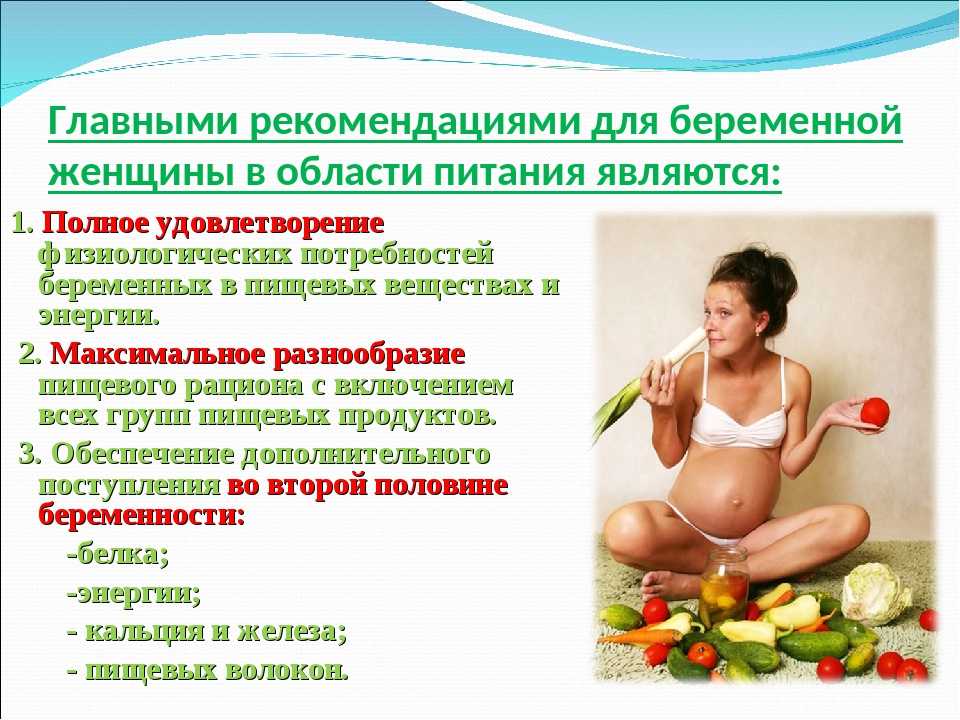
What else may help?
Pregnancy and the time after you deliver your baby can be wonderful, exciting, emotional, stressful, and tiring—all at once. These feelings may cause you to overeat, not get enough calories, or lose your drive and energy. Being good to yourself may help you cope with your feelings and follow healthy lifestyle habits.
Here are some ideas that may help.
- Sleep when the baby sleeps.
- Ask someone you trust to watch your baby while you nap, bathe, read, go for a walk, or go grocery shopping.
- Explore groups that you and your newborn can join, such as “new moms” groups.
- Don’t feel like you need to do it all on your own. Seek help from friends, family members, or local support groups.
Summary of Tips for Pregnancy
- Talk to your health care professional about how much weight you should gain during your pregnancy, and regularly track your progress.
- Consume foods and beverages rich in folate, iron, calcium, and protein.
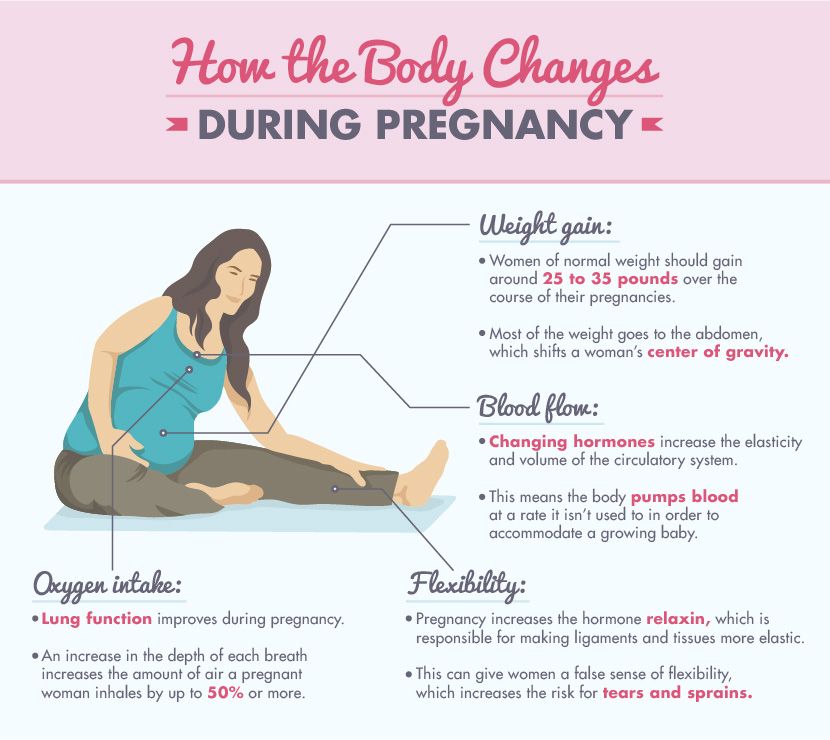 Talk with your health care professional about prenatal supplements (vitamins you may take while pregnant).
Talk with your health care professional about prenatal supplements (vitamins you may take while pregnant). - Eat breakfast every day.
- Eat foods high in fiber, and drink fluids (particularly water) to avoid constipation.
- Avoid alcohol, raw or undercooked fish, fish high in mercury, undercooked meat and poultry, and soft cheeses.
- Do moderate-intensity aerobic activity at least 150 minutes a week during your pregnancy. If you have health issues, talk to your health care professional before you begin.
- After pregnancy, slowly get back to your routine of regular, moderate-intensity physical activity.
- Gradually return to a healthy weight.
References
17 Pregnancy Do’s and Don’ts That May Surprise You
We include products we think are useful for our readers. If you buy through links on this page, we may earn a small commission. Here’s our process.
Healthline only shows you brands and products that we stand behind.
Our team thoroughly researches and evaluates the recommendations we make on our site. To establish that the product manufacturers addressed safety and efficacy standards, we:
- Evaluate ingredients and composition: Do they have the potential to cause harm?
- Fact-check all health claims: Do they align with the current body of scientific evidence?
- Assess the brand: Does it operate with integrity and adhere to industry best practices?
We do the research so you can find trusted products for your health and wellness.
Read more about our vetting process.Before your little bundle of joy arrives, you’re responsible for helping them grow in a nurturing, healthy environment.
This list of pregnancy do’s and don’ts can shed some light on what you should worry about — and what you really shouldn’t fret over.
1. Do take a multivitamin
Eating a balanced diet that’s rich in vitamins and minerals is the best way to provide your body with all of the healthy nutrients it needs to support a growing baby. A healthy diet alone, however, may not be enough for pregnancy.
A healthy diet alone, however, may not be enough for pregnancy.
Prenatal vitamins contain higher levels of certain nutrients that expectant mothers require at higher doses, such as:
- folic acid
- calcium
- iron
These vitamins assist with proper development of the fetus and help prevent birth defects. Your doctor can help you find a multivitamin or a series of vitamins that are best for you.
A multivitamin will usually include DHA, EPA, or both. These are omega-3 fats that are important for your baby’s proper brain development.
Don’t take more than one dose of multivitamins, though. Some vitamins in higher amounts can be harmful to the baby.
Shop for multivitamins online.
2. Do get lots of sleep
Changing hormone levels, anticipation, and anxiety can make sleep elusive during your 9 months of pregnancy. Pregnancy is demanding, especially in the final trimester, and you’ll need your sleep.
Take a quick snooze if you feel tired and schedule naps whenever you can. Set bedtimes and stick to them.
Set bedtimes and stick to them.
Aim for 7-9 hours of shut-eye each night. Fatigue is a sign that your body needs more rest, so give yourself all the sleep you can.
3. Do work out
Gone are the days of pregnant women avoiding lifting a finger during their pregnancies: We now know that exercise is good for mama and baby.
In fact, regular exercise may help you combat many of the issues that arise during pregnancy, including:
- insomnia
- muscle pain
- excessive weight gain
- mood problems
If you regularly exercised before you became pregnant, keep it up. Talk with your doctor about any adjustments you should make to your routine, especially as you move into your second and third trimesters.
If you didn’t exercise regularly before you found out you were expecting, ask your doctor about incorporating a fitness routine into your day. They can guide you into a program that’s safe and comfortable for you and your growing baby.
4. Do eat seafood
Seafood is loaded with vitamins and minerals, such as heart-healthy omega-3 fatty acids, zinc, and iron. These are all important for both mom and baby. But undercooked or raw seafood can cause some problems.
Seafood may carry harmful bacteria and viruses, which are eliminated when thoroughly cooked. Also, pregnant women should avoid raw fish and fish that may contain high levels of mercury.
Examples of fish containing high levels of mercury include:
- shark
- swordfish
- tilefish
- king mackerel
Eat a variety of seafood so you don’t have a concentration of minerals from one type of fish. Eat no more than 12 ounces of fish per week.
5. Do have sex
Sex during pregnancy is fine, as long as you don’t have a complicating factor such as placenta previa or another type of high-risk pregnancy.
Sex is safe with your partner right up until your water breaks. If you have discomfort you may have to try new positions. Talk with your doctor if you have any questions about the safety of intercourse during your pregnancy.
Talk with your doctor if you have any questions about the safety of intercourse during your pregnancy.
6. Do practice yoga
You should avoid Bikram or hot yoga, but other yoga modalities are fine when you’re expecting. Seek out prenatal or gentle yoga classes that are designed for mothers-to-be. Instructors in these classes will know which poses are best and which you should avoid.
If you weren’t doing yoga before you became pregnant, talk with your doctor before signing up for a class. While it’s possible you can start, it’s best to go over the risks and concerns with your doctor.
Shop for yoga mats now.
7. Do get a flu shot
Pregnant women can and should get a flu vaccine as long as you don’t have a contraindication as noted by the manufacturer.
The injection isn’t a live virus. You cannot get the flu from the flu vaccine. If you were to contract influenza during your pregnancy, the risk of severe side effects is greater than in women of the same age who aren’t pregnant.
The vaccine will protect you as well as your developing fetus.
8. Do gain weight smartly
The “eat for two” advice to expecting mothers isn’t a license to eat whatever you’d like. Instead, women need to be strategic about what they eat and how much.
Gaining a lot of weight during pregnancy may do more harm to your baby than good. During your first trimester, you only need about 100 extra calories a day to support your growing fetus.
By your third trimester, that additional calorie number is closer to 300 to 500 per day.
9. Do visit your dentist
Trips to the dentist’s office were avoided for decades for fear that an oral cleaning might cause bacteria to spread and lead to an infection. Now we know that’s just not the case.
In fact, the American College of Obstetricians and Gynecologists recommends that expectant mothers have a routine oral health assessment while pregnant, along with regular dental cleanings. Be sure to tell your dentist that you’re pregnant.
Healthline and our partners may receive a portion of revenues if you make a purchase using a link above.
10. Don’t smoke
Babies born to women who smoke during pregnancy are more likely to have a lower birth weight and are at a greater risk for learning disabilities than children born to nonsmoking mothers.
Additionally, children born to women who smoke are more likely to try smoking at a younger age and become regular smokers earlier, due to physiologic nicotine addiction.
11. Don’t drink alcohol
Alcohol may greatly impact your baby’s development. People who drink alcohol while pregnant could deliver a baby with fetal alcohol syndrome (FAS).
Symptoms of FAS include:
- low birth weight
- learning disabilities
- behavior problems
- lagging patterns in terms of growth and development milestones
Even small amounts of alcohol can be a problem. There appears to be no safe level of alcohol intake in pregnancy.
If you need help stopping drinking while you’re pregnant, talk with your doctor as soon as possible. The sooner you get help, the healthier your baby is likely to be.
12. Don’t eat raw meat
Raw and undercooked meat and eggs carry the risk of foodborne illness, such as listeriosis and toxoplasmosis. Food poisoning is also a possibility.
These conditions can cause serious, life-threatening illnesses that could lead to severe birth defects and even miscarriage. Make sure all eggs and meat that you eat while pregnant are well-cooked.
13. Don’t eat deli meat
Deli meats — including hot dogs, sausages, smoked salmon, and other cured meats — can cause foodborne illness, such as listeriosis and toxoplasmosis.
Meats that are sliced have far more surface area for bacterial growth. Thoroughly cooking these processed proteins well reduces your risk.
It’s also important to eat pasteurized (not raw) milk and cheese. Always wash produce to help eliminate harmful bacteria.
14. Don’t eat unpasteurized milk products
Calcium is very important for growing babies, but moms have to be careful how they get their calcium from dairy.
Raw milk isn’t recommended for expecting mothers since it’s unpasteurized. This means it hasn’t been heated to kill bacteria that could make you ill.
Specifically, raw milk may contain the bacteria Listeria. It can lead to illness, miscarriage, or even life-threatening consequences.
15. Don’t sit in a hot tub or sauna
Though relaxing, the high-heat environment of hot tubs, Jacuzzis, and saunas may be too dangerous for expecting mothers.
In fact, research suggests that using one of these during your first trimester may double your risk of miscarriage. Soaking in hot water can raise body temperature and this causes problems with the baby including increasing the risk of birth defects.
16. Don’t drink a lot of caffeine
Caffeine can travel through the placenta and increase your baby’s heart rate.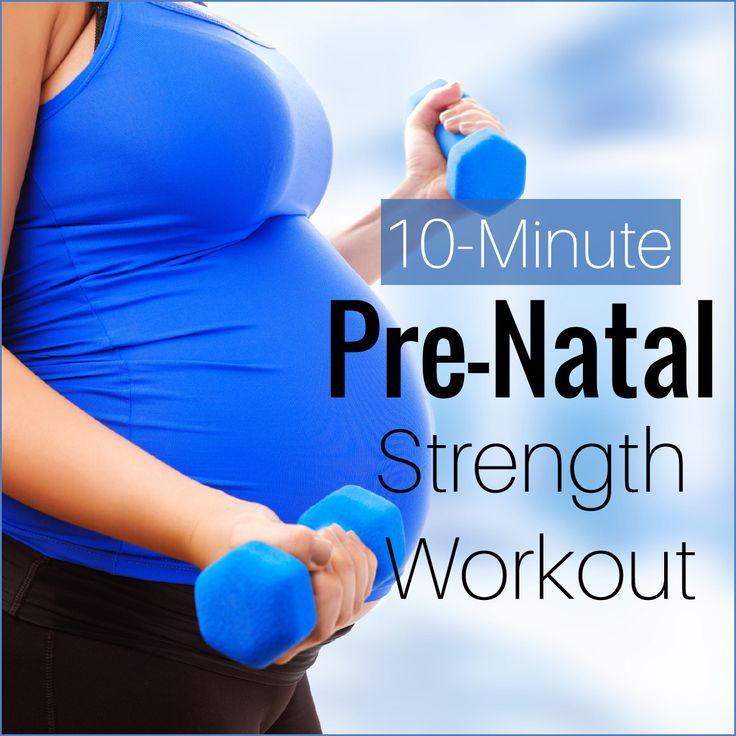
Current research suggests that women can safely consume a cup or two of coffee each day, but forego downing a triple-shot latte while you’re carrying.
17. Don’t clean the cat’s litter box
Pet your furry friend all you like and wash your hands afterward — but don’t clean a cat’s litter box.
Feline waste is filled with millions of bacteria and parasites. One in particular,Toxoplasma gondii, is particularly dangerous to expecting mothers.
If you contract it, you may never know until you begin having complications with your pregnancy. A miscarriage or stillbirth is possible. Babies who contract this parasite may face serious health problems, including seizures and mental disabilities.
Need a solution? Shop for self-cleaning litter boxes.
20 tips for pregnant women | ELLE
Family and children
Let's be honest - one of the main periods of a woman's life, the expectation of a child, is often accompanied by a number of difficulties, negative moments or doubts. ELLE has put together a set of 20 tips to help every pregnant woman navigate her pregnancy in the easiest way possible. This publication contains tips for all occasions - keep this memo in front of your eyes, and perhaps it will help you feel more positive and energetic all 9months.
ELLE has put together a set of 20 tips to help every pregnant woman navigate her pregnancy in the easiest way possible. This publication contains tips for all occasions - keep this memo in front of your eyes, and perhaps it will help you feel more positive and energetic all 9months.
1. Keep a pregnancy diary
It just seems that this idea is strange. In fact, rereading all the stages of changing your psychological and physical state, you will draw many useful conclusions for yourself. It is more convenient to conduct it by weeks: from the 1st to the 40th.
2. Don't panic!
It happens that a hormonal surge during pregnancy creates a feeling that they don’t understand you, they don’t take care of you enough, and during toxicosis the ability to dramatize various kinds of situations completely leads to a panic state. In this situation, there is nothing better than positive communication with specialists who have given birth to girlfriends, pregnant women on the forums. Download the “Happy Pregnancy” app, register on a forum for pregnant women or follow on Instagram (an extremist organization banned in Russia) a practicing psychologist, a specialist in pregnancy and childbirth, or a popular star mother on the net. Do not experience your condition and fears alone. In the end, if positive thinking does not come, know that this is not scary and this is not a pathology. According to statistics, about 40% of women do not perceive pregnancy as a blessing, they are subject to fears and doubts, and are under stress. In case you can’t do it yourself, feel free to sign up for group courses on preparing for childbirth or for a session with a psychologist. nine0003
Download the “Happy Pregnancy” app, register on a forum for pregnant women or follow on Instagram (an extremist organization banned in Russia) a practicing psychologist, a specialist in pregnancy and childbirth, or a popular star mother on the net. Do not experience your condition and fears alone. In the end, if positive thinking does not come, know that this is not scary and this is not a pathology. According to statistics, about 40% of women do not perceive pregnancy as a blessing, they are subject to fears and doubts, and are under stress. In case you can’t do it yourself, feel free to sign up for group courses on preparing for childbirth or for a session with a psychologist. nine0003
3. Don't be afraid to have an ultrasound
During these 9 months, ultrasound will be the main study that will allow you to understand how your pregnancy is going and how your baby is developing. Expectant mothers often worry about when to do the first ultrasound and whether it can be done in the short term. Previously, there was an opinion that ultrasound is a dangerous procedure, and it is often not recommended to do it. Today, experts assure that from a medical point of view, such a procedure is absolutely safe for you and the unborn child. Modern ultrasound devices have the functions of three-dimensional and four-dimensional imaging, which allow not only to observe the movements of the child, but also to identify rare or complex disorders of his cardiac activity at an early stage. Moreover, thanks to unique technologies, such as Philips Auto Face Reveal, during a planned ultrasound, future parents will be able to see the baby's face even during pregnancy. nine0003
Previously, there was an opinion that ultrasound is a dangerous procedure, and it is often not recommended to do it. Today, experts assure that from a medical point of view, such a procedure is absolutely safe for you and the unborn child. Modern ultrasound devices have the functions of three-dimensional and four-dimensional imaging, which allow not only to observe the movements of the child, but also to identify rare or complex disorders of his cardiac activity at an early stage. Moreover, thanks to unique technologies, such as Philips Auto Face Reveal, during a planned ultrasound, future parents will be able to see the baby's face even during pregnancy. nine0003
4. Stretch Mark Prevention Practice
Elemis "Japanese Camellia"
Most women seriously fear that skin elasticity will not return after childbirth. One of the main aesthetic problems that worries women during pregnancy is stretch marks. However, today manufacturers of beauty brands offer such a number of revolutionary products that only those who neglected prevention during pregnancy will face the problem. Take a cue from Victoria Beckham, who carried 4 children and never earned a single stretch mark. The secret of the star's success is Elemis "Japanese Camellia" oil. This unique treatment, rich in plant collagen, maintains skin elasticity and prevents stretch marks. It is used both during pregnancy and for massage. One of the most advanced pregnancy products, among other things, it is non-sticky, has a subtle neutral scent and is suitable for all skin types. nine0003
Take a cue from Victoria Beckham, who carried 4 children and never earned a single stretch mark. The secret of the star's success is Elemis "Japanese Camellia" oil. This unique treatment, rich in plant collagen, maintains skin elasticity and prevents stretch marks. It is used both during pregnancy and for massage. One of the most advanced pregnancy products, among other things, it is non-sticky, has a subtle neutral scent and is suitable for all skin types. nine0003
5. We use anti-edema products
Clarins
The problem of heavy legs and swelling is familiar to every pregnant woman. In any pharmacy, you can buy special tools to help fight swelling. In addition, buy compression stockings for pregnant women in an orthopedic salon - they are indispensable in late roses. It is also recommended to use special cooling foot creams at night. The best is Clarins. Miracle blue cream in a small jar improves blood circulation, instantly relieves tension and fatigue, refreshes the skin and gives a feeling of lightness and comfort.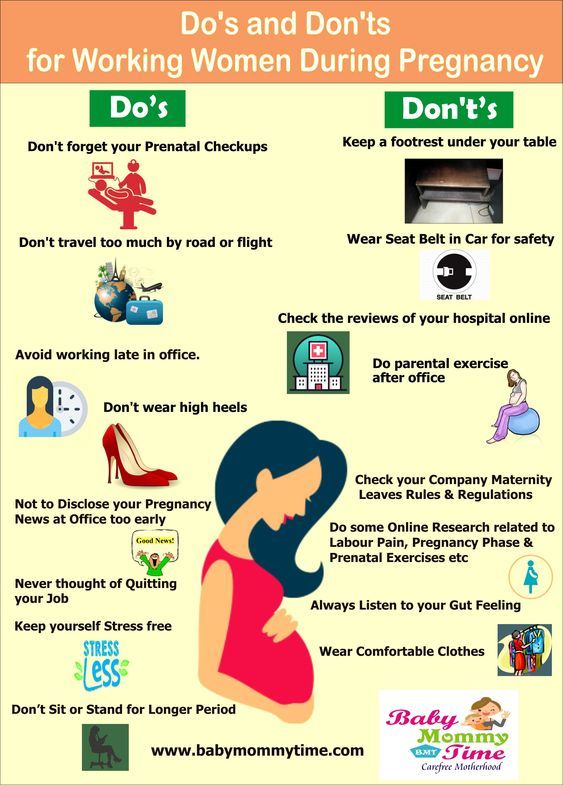 nine0003
nine0003
6. Buy Maternity Pillow
Special elongated banana-shaped pillow can be made from a variety of materials. Choose a filler that is comfortable for you - holofiber, swan artificial fluff or granules. At first glance, it seems that this is a useless accessory, but from the middle of the second trimester, every pregnant woman begins to experience serious discomfort during sleep due to the appearance of the stomach. A special pillow helps to distribute body weight in such a way that you will be able to sleep comfortably on your back and on your side. nine0003
7. Wear a bandage
From the end of the second trimester, you will feel back pain due to the appearance of the abdomen. To ease the load on the back and support the abdominal muscles, use a special bandage. There are a lot of variations of colors and models: on hooks and Velcro, zippers and fasteners. It is better to trust specialists from an orthopedic salon, rather than choosing a popular model from a lingerie store.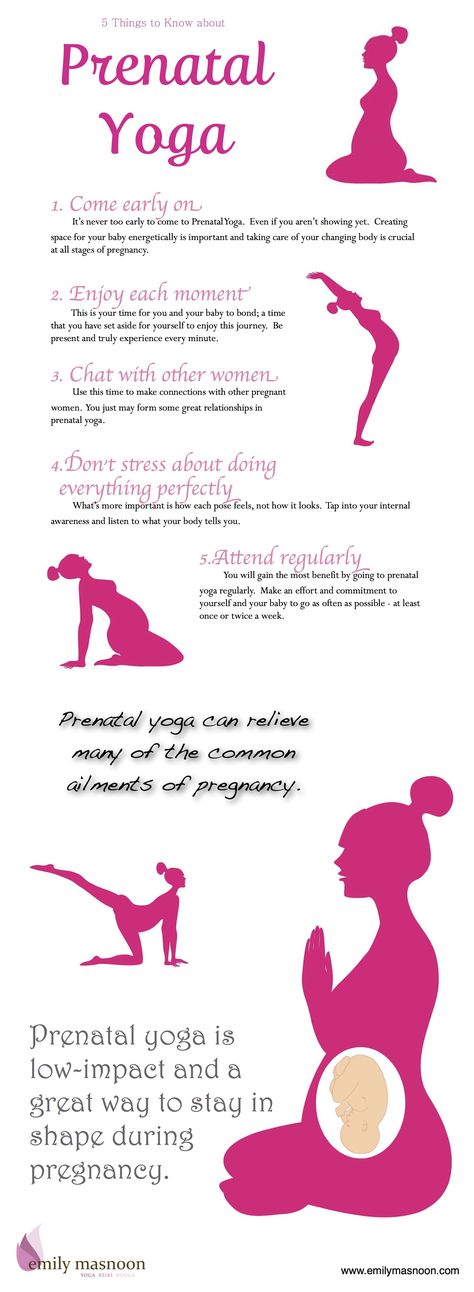
8. Plan your stroller carefully
Stokke Xplory
This is probably the most pleasant and important purchase for your future baby, so choose responsibly. The stroller should be light, convenient, comfortable, mobile, and therefore it is very important to arrange a minimal test drive for it. Or trust the power of the brand. So, today the absolute leader is the Stokke Xplory model, which is called the stroller for perfect contact. The iconic Scandinavian brand that creates the trendiest minimalist strollers, which are especially popular with stars and it-girls, offers the most innovative solutions - height adjustment that allows you and your child to be as close as possible to each other, comfortable handles, footrests, endless choices. seating positions and plenty of options that will really make it easier for a new mom. A wide range of accessories will allow you to choose the most stylish additions to your stroller. Add mobility, comfort and style here. In a word, our favorite model will definitely not disappoint you.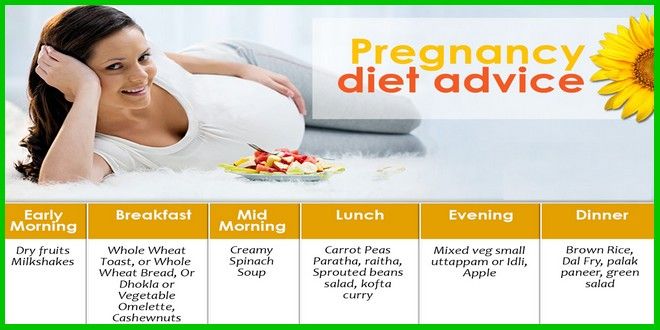 nine0003
nine0003
9. Give up hardware procedures
Unfortunately, you will have to be patient. No LPG, lasers and other beauty aids. Throughout pregnancy, you should not do laser and photoepilation, electrolysis, visit a solarium. By the way, fillers are also banned.
10. Be careful with medicines
Before taking any pill, even if it is a common cold or headache, consult your doctor. Also, carefully read all the instructions for contraindications during pregnancy. nine0003
11. Get in touch with a doctor
We live in a time when going to the antenatal clinic several times during pregnancy without an individual approach has sunk into oblivion. Today it is very important to be in touch with your doctor - his mobile should always be at your fingertips. Build relationships in such a way that you have the opportunity to receive a recommendation via Skype or report via SMS about the problem that worries you.
12. Don't be afraid to travel
Only in our country, traveling during pregnancy is treated as extreme. In fact, a vacation on the sea coast is a very useful activity for pregnant women. Of course, you must obtain the consent of a doctor and have no contraindications for flying. If the pregnancy passes without complications, flying to hot countries is not prohibited. Of course, it is important to remain vigilant: choose not the most exotic destinations, do not stay in the open sun for a long time, do not contact children, drink only bottled water, etc. nine0003
In fact, a vacation on the sea coast is a very useful activity for pregnant women. Of course, you must obtain the consent of a doctor and have no contraindications for flying. If the pregnancy passes without complications, flying to hot countries is not prohibited. Of course, it is important to remain vigilant: choose not the most exotic destinations, do not stay in the open sun for a long time, do not contact children, drink only bottled water, etc. nine0003
13. A glass of wine - you can!
Of course, we understand that alcohol and cigarettes are prohibited, but sometimes, very rarely, you can afford a glass of wine. Especially on vacation. Treat limitations without bigotry. But don't make a glass of wine with dinner a habit. Any doctor will tell you that one glass of wine a week won't hurt you or your baby.
14. Save your baby's first womb photo during your first ultrasound
Just because it's touching. nine0003
15. You can dye your hair!
Our mothers were not lucky - they had to deny themselves the pleasure of being beautiful during pregnancy. Today we have every opportunity not to feel restrictions in matters of self-care. Yes, ammonia paints can indeed be dangerous, but today there are also ammonia-free dyes. So, the CHI brand has all the possible world patents that officially allow the use of this dye during pregnancy. The thing is that the composition of the innovative paint does not include ammonia. If earlier, in order to change hair color, it was necessary to get rid of your own pigment with ammonia, and then paint over your hair with the desired shade, now your natural pigment is planted with one that will change the shade without harm to the hair. In addition, American CHI silk dyeing is not only not harmful, but even useful - the dye contains silk, which fills the hair in places of damage, making it more elastic. In Moscow, you can try this technology in the CHI Color Studio on Tverskaya-Yamskaya. nine0003
Today we have every opportunity not to feel restrictions in matters of self-care. Yes, ammonia paints can indeed be dangerous, but today there are also ammonia-free dyes. So, the CHI brand has all the possible world patents that officially allow the use of this dye during pregnancy. The thing is that the composition of the innovative paint does not include ammonia. If earlier, in order to change hair color, it was necessary to get rid of your own pigment with ammonia, and then paint over your hair with the desired shade, now your natural pigment is planted with one that will change the shade without harm to the hair. In addition, American CHI silk dyeing is not only not harmful, but even useful - the dye contains silk, which fills the hair in places of damage, making it more elastic. In Moscow, you can try this technology in the CHI Color Studio on Tverskaya-Yamskaya. nine0003
15. Choose a sport that suits you
Don't try to be hyperactive during pregnancy, but don't stop exercising completely either. As a rule, all girls in position make a choice between yoga and swimming. Both of these methods are safe for pregnant women and help improve blood circulation. Attention: we are talking about special yoga classes for pregnant women, which is different from the usual classes.
As a rule, all girls in position make a choice between yoga and swimming. Both of these methods are safe for pregnant women and help improve blood circulation. Attention: we are talking about special yoga classes for pregnant women, which is different from the usual classes.
16. Update your wardrobe wisely
Of course, you will need comfortable clothes, but resist the temptation to buy everything at once. Fashion for pregnant women is very peculiar, you are unlikely to wear all this oversize later. It will be much more appropriate to buy basic things - leggings, a few T-shirts and sundresses. Don't be afraid of pulling off dresses: sometimes emphasizing the forms is a much more interesting story than trying to hide them with the help of oversized outfits that will then gather dust on the shelf. nine0003
17. Forget about heels
Believe me, we stand up for the beauty of women during pregnancy, but heels are too big a sacrifice. Swelling, heaviness in the legs, the general condition of a slight loss of coordination - choose only comfortable shoes. Any dress code is absolutely loyal to a pregnant woman!
Any dress code is absolutely loyal to a pregnant woman!
18. Throw a traditional Baby Shower party
This is probably the most enjoyable moment of your entire pregnancy. In America, such parties have been a good tradition for many years, and today they are becoming a real trend in our country. In fact, this event is a bachelorette party dedicated to the birth of a baby. The main thing here is the entourage and proper organization. Of course, it is better to trust professionals in this matter so that they create your perfect Baby Shower - with the right decor, candy bar and other beauty. The main guru of the capital Ekaterina Meskhi, the founder of the It's a babyshower company for organizing children's parties and the creator of the Instagram page (an extremist organization banned in Russia) @its_a_babyshower_ru, advises choosing a bright room for organizing the perfect Baby Shower, as well as decor from the case of the company with which you are planning working is a blessing, an impressive selection of rattles, garlands, balloons and delicate desserts is now huge! "Cupcakes, cakepops, macaroons, cookies - our confectioners decorate all these desserts with bodysuits, bears, strollers! The color scheme is delicate - blue or pink, but there are exceptions. In a word, there is no limit to creativity! The main entertainment at the "babishauer" is, of course, receiving gifts. Actually, this is where the name baby shower came from - it literally means "to overwhelm the unborn baby with gifts. Often the party program includes special postcards, for example, in the form of bodysuits, on which each guest leaves a wish for the unborn baby, " says Ekaterina. nine0003
In a word, there is no limit to creativity! The main entertainment at the "babishauer" is, of course, receiving gifts. Actually, this is where the name baby shower came from - it literally means "to overwhelm the unborn baby with gifts. Often the party program includes special postcards, for example, in the form of bodysuits, on which each guest leaves a wish for the unborn baby, " says Ekaterina. nine0003
Prepare the baby's dowry. Buying tiny bodysuits, booties and hats will give you a lot of positive emotions. You can't even imagine how exciting it is! However, wait for the "babishauer" first - perhaps your friends will give you a lot of useful things that will allow you to avoid unnecessary expenses. The most rational expectant mothers usually make a wish list and send it to those invited to the party, but in this case there will be no surprise.
19. Eat right
Victoria Dyakova, nutriclub.ru expert, child nutrition specialist and psychologist, says that the first rule of rational nutrition for a future mother is not to starve: allow yourself a light snack between main meals.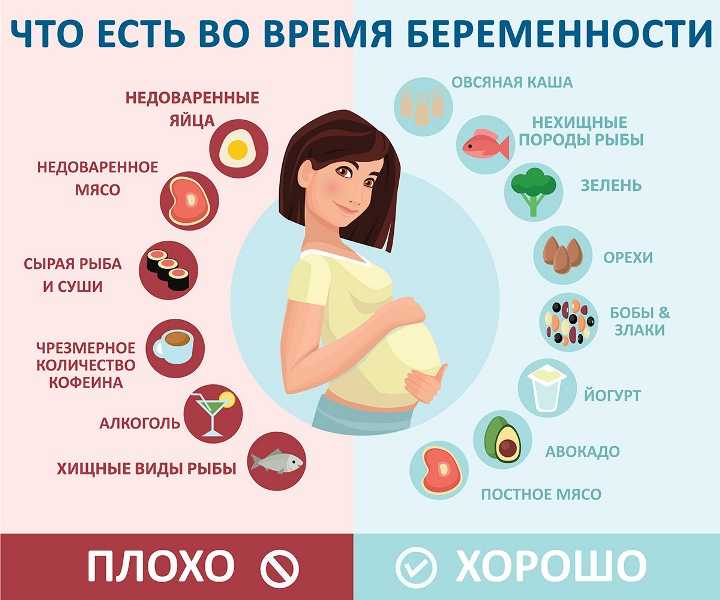 Try to make your diet varied and balanced. Your daily menu should include freshly squeezed juices, soups and dairy products. Also, fish, lean meat, eggs are very useful for pregnant women - all foods rich in iron and other useful substances. Do not eat canned foods, sausages, sausages. And if you really want sweets, give preference to natural jams and fruits, instead of buns and chocolate. nine0003
Try to make your diet varied and balanced. Your daily menu should include freshly squeezed juices, soups and dairy products. Also, fish, lean meat, eggs are very useful for pregnant women - all foods rich in iron and other useful substances. Do not eat canned foods, sausages, sausages. And if you really want sweets, give preference to natural jams and fruits, instead of buns and chocolate. nine0003
20. Plan an original late pregnancy photo shoot
Today, such "pregnant" photosets are classics of the genre. Believe me, over time you will look at these photos again and again - this very special and in its own way wonderful state has such magic that you will thank yourself for capturing this moment. time, trusting the natural restructuring of the body under the strict guidance of nature.Taking care of your health and well-being in advance, it is easy to prevent possible complications and focus on the main thing.0003
The third trimester of pregnancy is the happiest, but at the same time the most "exciting" period of pregnancy.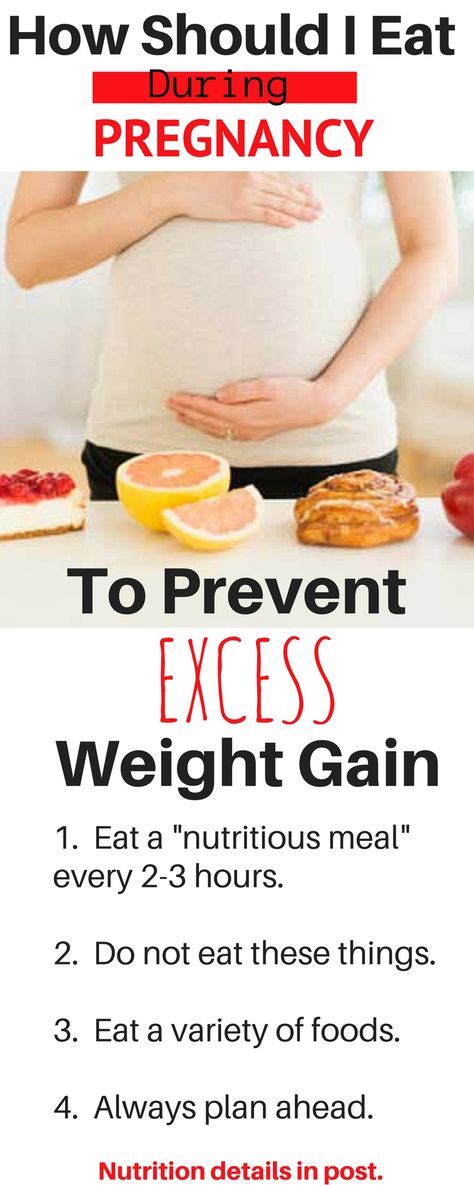 The baby is about to be born, and the mother begins to actively prepare for childbirth. What rules should a woman follow in order to give birth to a healthy child?
The baby is about to be born, and the mother begins to actively prepare for childbirth. What rules should a woman follow in order to give birth to a healthy child?
1. Do not miss weekly visits to the obstetrician-gynecologist who is leading your pregnancy, follow his advice.
2. In the third trimester of gestation monitor the weight gain, count the amount of fluid drunk and excreted per day. nine0121 The amount of liquid drunk is all drinks, soups, as well as half the volume from fruits and dairy products. The amount of fluid excreted is the volume of urine (diuresis). If these numbers are the same, then everything is fine. If the volume of fluid drunk exceeds daily diuresis, then this may indicate latent edema that forms in the intercellular spaces of tissues and organs. Latent edema may be the result of such a serious complication of pregnancy as preeclampsia, which can be accompanied not only by latent edema, but also by swelling of the arms and legs, high blood pressure, proteinuria - the appearance of protein in the urine. 3. Eat right! Proper nutrition in the third trimester of pregnancy is of particular importance, because the female body begins to work in a new way - in the mode of intensive preparation for labor. How your diet will be in the last months of pregnancy largely depends on how the birth will go. Follow the following rule : the closer the due date, the lighter the diet should be. In the last months of pregnancy, the body should spend efforts on preparing for childbirth, and not on the digestion of heavy food. nine0003 Eliminate from the diet such harmful foods as fast food, carbonated drinks, pickles, marinades, mushrooms, Useful cranberries, gooseberries, red and white currants), fruits (bananas, apples, prunes, pears in limited quantities), juices, vegetables (carrots, tomatoes, cucumbers, beets, onions, sweet peppers), greens. 4. Get enough sleep . 5. Be active, move, don't lie on the couch all day! Many women in the third trimester become lazy, stop walking and exercising. But lying on the couch all day won't prepare your pelvic floor muscles for childbirth. Moderate physical activity not only does not harm the expectant mother or child, but also helps to maintain your health and well-being, contributes to an easy birth and the appearance of a healthy baby. nine0003 In the third trimester of pregnancy, you can continue to do some of the exercises that you did in the first and second trimesters, choosing those that are easy for you. Practice morning and evening leisurely walks, do not give up your favorite wellness activities until childbirth - go to yoga and swimming, master breathing techniques, gymnastics with a fitball. Remember that in the third trimester of pregnancy, both cycling and horseback riding are strictly contraindicated. nine0140 It is very important that you wear comfortable clothes and shoes while walking. Do not wear high heels . Your baby is growing by leaps and bounds, so mom quickly gains weight. The center of gravity of a pregnant woman shifts due to the growing uterus, as a result of which the deflection in the lumbar spine (lumbar lordosis) increases, which can create certain difficulties and even pain in the lumbar region. Shoes with high heels further increase the deflection in the spine, and any awkward movement can cause a fall and injury to a pregnant woman. nine0003 Clothing should not restrict movement and pinch blood vessels so as not to disturb blood flow. Remember that activity in the third trimester of pregnancy is the key to a quick and easy delivery. nine0003
nine0003  Sufficient sleep is the key to your well-being, excellent mood, and normal development of the fetus. The duration of sleep should be such that after waking up you feel rested and alert. In order for the body to recover, you must sleep at least 8-10 hours. Remember your baby is very sensitive to all changes in the mother's mood.
Sufficient sleep is the key to your well-being, excellent mood, and normal development of the fetus. The duration of sleep should be such that after waking up you feel rested and alert. In order for the body to recover, you must sleep at least 8-10 hours. Remember your baby is very sensitive to all changes in the mother's mood. 